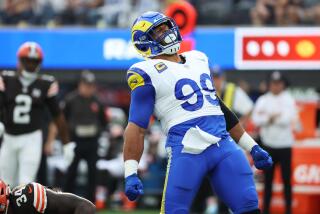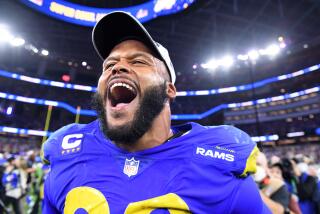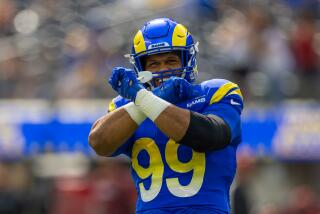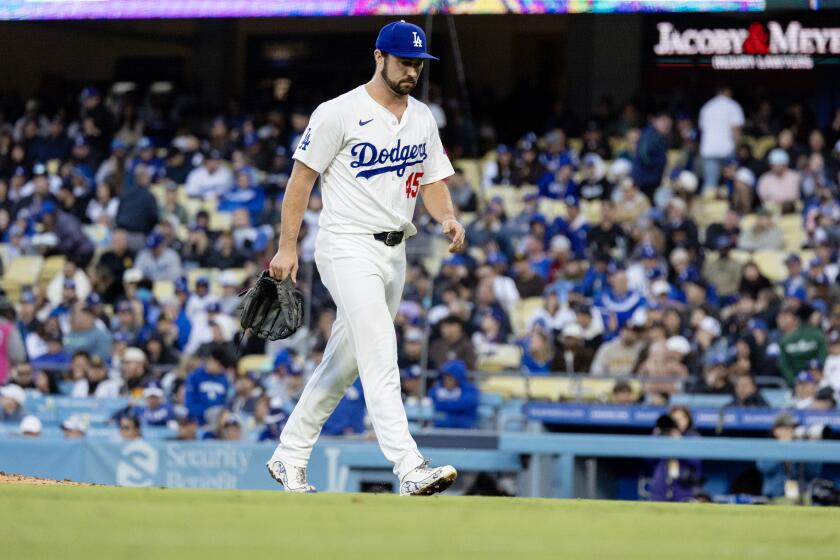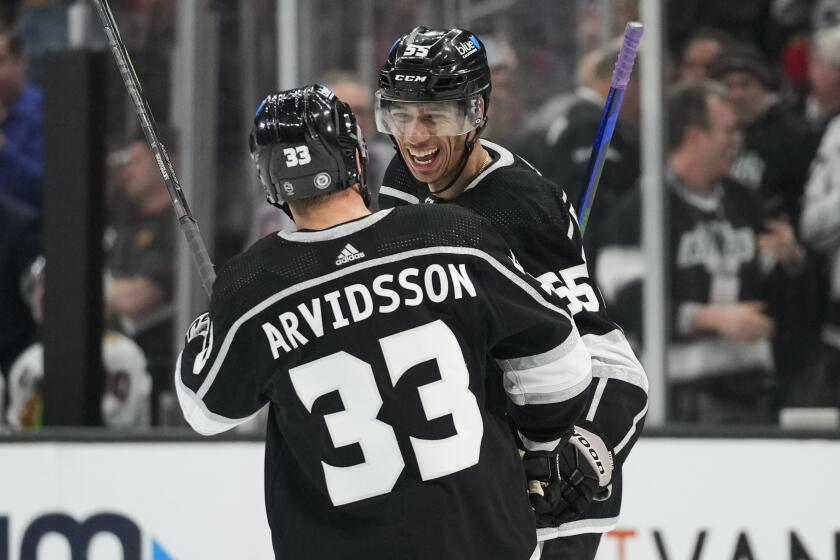Amid NFL lockout, battered retirees talk justice
They are rebels with a cause. In their playing days, the NFL taught them to be competitors, never to go down without a fight.
And so, in a quiet meeting room last weekend, away from the madding crowds of a Las Vegas casino, they got mad all over again. They have lost their youth but not their spunk.
There are an estimated 21,000 NFL retirees. There are several groups that represent them, each with an agenda built around anger for the National Football League. This group was the Independent Football Veterans Inc.
PHOTOS: The NFL and head injuries
Visualize large men in broken bodies and listen to them as they talk about how the hits of yesteryear affect them now:
Dave Pear, 57, veteran of six years and three NFL teams: “I played for the Raiders with a herniated disk in my neck. Al Davis told me I could play hurt better than anyone he had seen. When I couldn’t play anymore, I went to him for help, and he told me he would take responsibility for my neck injury, that he would give me a call. That was 30 years ago. I’m still waiting for the call.”
John Houser, 75, veteran of six years and three NFL teams, including the Rams: “My doctor tells me I’m in danger of getting dementia, and in six or seven years, that could grow into Alzheimer’s. I just lost two of my friends and teammates to that, Tom Fears and Les Richter.”
Bob Stein, 63, veteran of seven teams in six years and now a prominent lawyer in Minnesota: “It was in a 1971 game for the Rams. I got into a vicious collision, came out of the game, they gave me smelling salts, and the doctor asked, ‘Can you play?’ I’m a 22-, 23-year-old kid. What am I gonna say? So I looked at my jersey, saw it was red and knew that was the team I should follow out onto the field. Twelve years later, I got a sinus infection, it got into a crack that had never healed from that big collision, and I almost died.”
Dan Bunz, 55, veteran of eight seasons, seven with the 49ers and the man best remembered for a crushing goal-line tackle of Cincinnati’s Charles Alexander in the 1982 Super Bowl: “I worry about losing my memory. My wife tells me I already told her that story. I don’t want to get to the stage where my wife has no help, and I’m running around the farm with my clothes off.”
George Visger, 52, veteran of two seasons with the 49ers: “I’ve had nine brain surgeries, I have dementia, I’ve had 55-minute grand mal seizures. I’ve taken six different medications for seizures. The team doctor once let me drive to the hospital after seeing that my brain was hemorrhaging, and when I came back after 14 days in intensive care, they said they’d get me a special helmet. I qualify, after 13 NFL-related surgeries, for zero NFL benefits.”
Pear again, summing up his feelings about the NFL: “The only difference between ‘scam’ and ‘scum’ is a vowel.”
The retirees say the NFL pension and disability plans are woefully inadequate. The actual phrase they use is “a joke.”
The pension plan has gone through several updates, starting in 1959, on through the Bert Bell and Pete Rozelle plans of 1962 and 1989, respectively, and ending up with the current 1993 Bell-Rozelle plan. In general, that brings a player who retired in the immediate years after 1981 an annual pension of about $3,000, multiplied by the number of years he played. A more recent retiree gets closer to $5,640. The average NFL career is 3.5 years.
Disability is another issue. If a player is deemed by a review board to be “totally and permanently disabled,” his monthly award is $4,000 but only if the board finds that the disability is football related. If not, the award is $1,500. In 2006, for example, only 3% of retired NFL players received disability benefits.
A recent addition by the NFL is the “88 Plan,” named after famed Baltimore Colt tight end John Mackey, a dementia victim. That provides $88,000 a year for institutional care.
These should be the best of times for the NFL. TV ratings are sky high. Sellouts are almost a given. For many, it is more religion than sport. Its Super Bowl has gone past the big-game category and all but become a national holiday.
Its young commissioner, Roger Goodell, is bright, clued in and seemingly suited to lead his league to more of the same success, perhaps even to the promised land of the NFL’s lost city, Los Angeles.
But dark clouds gather on the horizon. The owners have locked out the current players. The argument is over distribution of an extra $1 billion of league revenue. One could theorize that when there is $1 billion to argue over, there should be no argument. The owners seem to think the players are overpaid gladiators. The players seem to think the owners are trying to get them to pay for new furniture in their Learjet.
This dance of greedy, finger-pointing labor disputes is, sadly, nothing new on the American pro-sports scene. It comes, it goes, and the fan hustles back to his overpriced seat, happy as a clam and indifferent to any scars left behind.
Usually.
This time, there seem to be more furrowed brows among those who buy tickets and watch games on TV. Why is a work stoppage needed when everybody is making money, when you have the big game in town? Is this a lockout or a shakedown?
Then, when you add to this the crescendo of unrest among the pioneers of the game, fans may pause even longer. The retirees’ anger is that the NFL has turned its back on its own, used them and spit them out. They say the league, with more than enough money to do something, has failed to show the common decency of admitting some liability for hits its players have taken and their horrible later effects.
So, if the NFL is not helping most of its retired players with medical benefits for injuries clearly having taken place on its watch, then who is paying for this?
Taxpayers, if course. Think Social Security benefits, Medicare. Think billions of dollars.
In a recent early poll on the NFL labor dispute conducted by FoxSports.com, nearly 80% of those questioned sided with the players and against the owners. That’s an unheard-of response. Also a wake-up call.
Maybe the league that is too big to care better start.
More to Read
Get our high school sports newsletter
Prep Rally is devoted to the SoCal high school sports experience, bringing you scores, stories and a behind-the-scenes look at what makes prep sports so popular.
You may occasionally receive promotional content from the Los Angeles Times.
